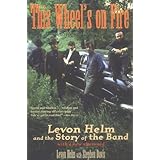
Average Reviews:

(More customer reviews)In this book, it feels like Levon Helm is honestly trying to tell the real story of The Band, without prettying it up too much or casting too many aspersions. The overwhelming feeling I had when reading this book is that he feels there's too much Robertson -- and maybe too much Helm -- in the popular vision of The Band, and he seems to be making a conscious effort to ensure that Rick Danko, Garth Hudson, and especially Richard Manuel get their fair share of the credit.
Judging by the way this book reads, it seems that it's largely composed of verbal reminiscences by Helm, later pieced together by Davis and embellished with accounts from other interested parties. This can make for confusing reading -- you have to either be alert to changes of voice or be willing to back up and remind yourself who said this or that. It also leads to some apparent "mood swings" on Helm's part -- it is clear that there are certain things about the history of The Band that still make him angry. His attitude toward Robbie Robertson is a case in point: the guitarist is "Robbie" throughout most of the book, becomes "Robertson" when Helm is talking about business/publishing quarrels and the whole "Last Waltz" situation, and then turns back into "Robbie" when Helm is discussing less loaded issues or reminiscing about the good times.
It's also very clear that Helm feels guilt as well as grief about Richard Manuel. The story begins with Manuel's death and then goes back to the beginning, and several times alludes to warning signs of Manuel's emotional instability that Helm seems to feel they should have caught. The final comment by Helm on Manuel's death sounds more like someone trying to think of a reason for the tragedy, rather than saying what he honestly believes happened. That segment sounds like a reflection of Helm's enduring wish to make sense of his friend's death, rather than a seriously-offered explanation for why it happened.
Even Robbie Robertson does not get the raking one might expect, given the long-standing bad blood between the two. Helm is pretty scathing about how "The Last Waltz" turned out, and he is not impressed that Robertson went along with the label's tendency to make Robertson the "star" of The Band and everyone else "sidemen" (the group's distaste for that term having already been established.) But in a number of instances it is clear that in retrospect Helm doesn't feel Robertson was intentionally trying to hurt anyone else, and he does not attempt to diminish Robertson's role in the group (although he takes a pin to the notion that Robbie was the only one writing the songs.) Is this objective truth? I have no idea, but in a music industry in which Paul McCartney does not own the rights to his own songs, it certainly seems possible that more than one person deserved credit for the songs of The Band.
Another factor in this book's favour is the fact that it is fun to read. Yes, its structure can be confusing. And yes, Helm is folksy. And he certainly does not go into the sex and drugs aspect of the story. (He does mention so many car crashes that it seems incredible that Manuel lived as long as he did, and nobody else got killed either.) But between them the two authors have gathered up dozens of crudely funny quips from Ronnie Hawkins (who comes off sounding like your most embarrassing but lovable uncle with a few drinks aboard) and Helm's account of Rick Danko and the deer, and his own accidental gunshot wound, are priceless. Some of Helm's ways of expressing himself are also pretty funny -- for example, his off-hand description of a road manager he didn't care for ("He was OK, but you wouldn't send him for the ammunition.") And you can tell he honestly loved the group and his bandmates, which is probably part of the reason there are still things he can't discuss dispassionately -- this is not a picture of a reserved or dispassionate man.
Is this the "real truth" about The Band? I don't know. I suspect even the men who were there would have different answers to that question. But it reads like one man's attempt at honesty, as well as a heartfelt tribute to the people he loved and the days they shared. It's not, to me, a bitter tale, but it is certainly bittersweet.
Click Here to see more reviews about: This Wheel's on Fire: Levon Helm and the Story of the Band
The Band, who backed Bob Dylan when he went electric in 1965 and then turned out a half-dozen albums of beautifully crafted, image-rich songs, is now regarded as one of the most influential rock groups of the '60s. But while their music evoked a Southern mythology, only their Arkansawyer drummer, Levon Helm, was the genuine article. From the cotton fields to Woodstock, from seeing Sonny Boy Williamson and Elvis Presley to playing for President Clinton, This Wheel's on Fire replays the tumultuous history of our times in Levon's own unforgettable folksy drawl. This edition is expanded with a new afterword by the authors.
Click here for more information about This Wheel's on Fire: Levon Helm and the Story of the Band

0 comments:
Post a Comment